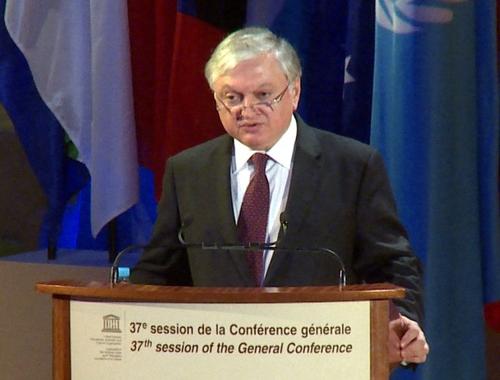Armenian Heritage Faces Destruction in Azerbaijan, Nalbandian Tells UNESCO
YEREVAN—Armenia’s Foreign Minister participated in the 37th session of the UNESCO General Conference, which is dedicated to summarizing the work of the organization during the last two years and discussing the main directions of upcoming activities.
In his statement Foreign Minister Edward Nalbandian particularly mentioned that Armenia attaches great importance to the goal of UNESCO in encouraging intercultural dialogue, understanding and tolerance.
“Since last May, Armenia has assumed the Chairmanship of the Committee of Ministers of the Council of Europe, making the fight against xenophobia, hate-speech and intolerance its key priorities,” Nalbandian said.
He continued by stressing that the destruction and otherwise ill treatment of cultural and historical heritage should be as strongly disapproved of as violence against people.
Nalbandian pointed to the destruction by Azerbaijanis in Nakhijevan of thousands of delicately carved Armenian cross stones, dating from the 9th to the 16th centuries, as a vivid manifestation of such a crime.
“Several thousands of these great medieval sculptures were bulldozed over with the Azerbaijani government’s blessings and the area was turned into a military camp in a government sanctioned operation,” Nalbandian said. “The 16th International Council on Monuments and Sites (ICOMOS) General Assembly resolution regretfully stated with regard to this vandalism: ‘this heritage that once enjoyed its worthy place among the treasures of the world’s heritage can no longer be transmitted today to future generations,’” he added.
Nalbandian also noted that the Armenian government’s numerous calls for sending international fact-finding missions to Nakhijevan, as well as attempts by a number of international organizations and countries, have been either ignored or rejected by the Azerbaijani side.
“The Universal Declaration of Human Rights and the UNESCO Convention against Discrimination in Education state that ‘Education shall promote understanding, tolerance and friendship among all nations, ethnicities or religious groups.’ Taking into consideration UNESCO’s unique role in the sphere of education, we call upon the organization to create within its educational programs an overview mechanism that will examine and evaluate textbooks used in member-states’ educational systems, especially in history and social sciences, with a special emphasis on ensuring the exclusion of racism or xenophobia,” Nalbandian said.
“Armenian heritage, culture, and history, after surviving continuously for three millennia, is today being destroyed, damaged, and distorted in Azerbaijan,” the Foreign Minister said.

